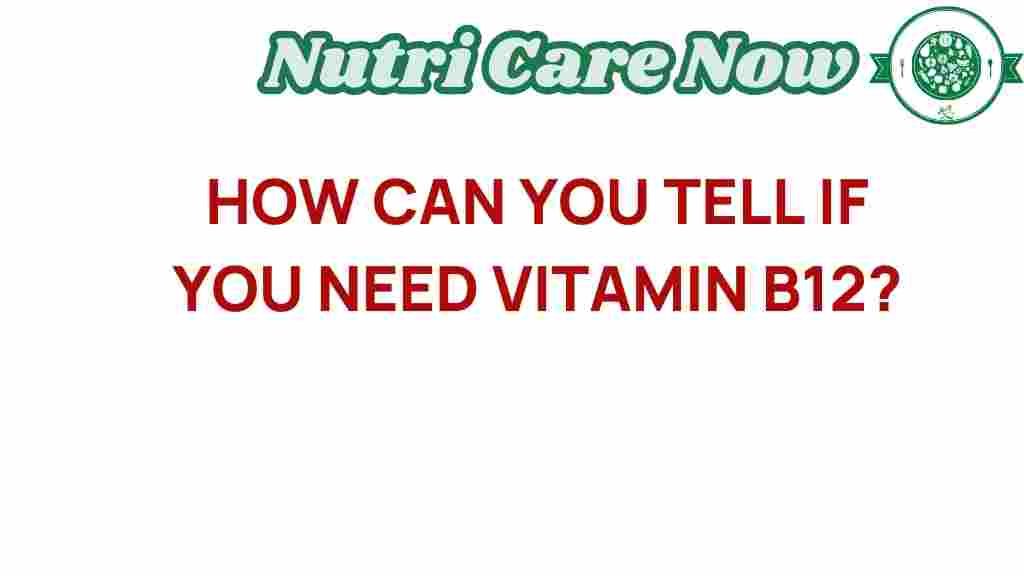Unveiling the Signs: Do You Really Need Vitamin B12?
Vitamin B12, also known as cobalamin, is a crucial nutrient that plays a significant role in maintaining our overall health and wellness. As a water-soluble vitamin, it is essential for the production of red blood cells, DNA synthesis, and the proper functioning of the nervous system. However, many individuals may not realize that they are at risk for a deficiency in vitamin B12. In this article, we will explore the signs and symptoms of vitamin B12 deficiency, its impact on health, and how to ensure you’re getting enough of this vital nutrient through diet and supplements.
Understanding Vitamin B12 and Its Importance
Vitamin B12 is primarily found in animal products, which makes it particularly important for those following vegetarian or vegan diets. However, even individuals who consume meat can be at risk of deficiency due to various factors, such as absorption issues or certain medical conditions. Here are some key roles of vitamin B12 in the body:
- Red Blood Cell Formation: Vitamin B12 works alongside folate to produce red blood cells, preventing anemia.
- Nervous System Health: It is vital for maintaining the myelin sheath that protects nerve fibers, thus supporting proper nerve function.
- DNA Synthesis: It plays a role in the synthesis of DNA, which is essential for cell division and overall health.
- Energy Production: It helps convert food into energy, which can influence your overall energy levels.
Signs and Symptoms of Vitamin B12 Deficiency
Recognizing the signs of vitamin B12 deficiency is crucial for maintaining optimal health. Here are common symptoms to look out for:
- Fatigue and Weakness: A common early sign, low levels of vitamin B12 can lead to decreased energy and fatigue.
- Pale or Jaundiced Skin: A lack of vitamin B12 can cause the skin to appear pale or slightly yellow due to problems with red blood cell production.
- Nerve Problems: Tingling or numbness in the hands and feet, and balance issues can indicate nerve damage from deficiency.
- Cognitive Changes: Memory loss, difficulty thinking clearly, and mood changes may occur due to inadequate B12 levels.
- Glossitis and Mouth Ulcers: Inflammation of the tongue and mouth sores can also be signs of vitamin B12 deficiency.
Who is at Risk for Vitamin B12 Deficiency?
Certain populations are more susceptible to vitamin B12 deficiency due to dietary restrictions or health conditions. These groups include:
- Vegetarians and Vegans: As plant-based diets lack sufficient B12 sources, individuals following these diets should monitor their intake closely.
- Individuals Over 50: Aging can affect the absorption of vitamin B12 from food.
- People with Digestive Disorders: Conditions like Crohn’s disease or celiac disease can impair nutrient absorption.
- Those Taking Certain Medications: Some medications, such as proton pump inhibitors and metformin, can interfere with B12 absorption.
How to Ensure Adequate Vitamin B12 Intake
Maintaining optimal levels of vitamin B12 involves a combination of diet and supplementation. Here’s how you can ensure you’re getting enough:
Dietary Sources of Vitamin B12
Including vitamin B12-rich foods in your diet is one of the most effective ways to prevent a deficiency. Here are some excellent sources:
- Animal Products: Meat, poultry, fish, eggs, and dairy are the best natural sources of vitamin B12.
- Fortified Foods: Certain cereals, plant-based milk, and nutritional yeast are often fortified with B12.
- Supplements: For those who struggle to meet their needs through diet alone, vitamin B12 supplements are an option.
Step-by-Step Process for Monitoring Your Vitamin B12 Levels
To ensure you are maintaining adequate vitamin B12 levels, follow these steps:
- Assess Your Diet: Keep track of your food intake and identify if you are consuming enough sources of vitamin B12.
- Recognize Symptoms: Be aware of the signs of deficiency discussed earlier and consult with a healthcare professional if you experience them.
- Get Tested: If you suspect a deficiency, ask your doctor for a blood test to measure your vitamin B12 levels.
- Adjust Your Diet or Supplement: Based on your test results, consider adjusting your diet or taking a vitamin B12 supplement.
Vitamin B12 Supplements: Are They Necessary?
For some individuals, particularly those at risk of deficiency, vitamin B12 supplements can be beneficial. Here’s what you need to know:
- Types of Supplements: Vitamin B12 is available in various forms, including tablets, capsules, and injections. Methylcobalamin and cyanocobalamin are common forms.
- Consult a Healthcare Provider: Before starting any supplement regimen, it’s advisable to consult with a healthcare provider to determine the appropriate dosage.
- Potential Side Effects: Vitamin B12 supplements are generally considered safe; however, excessive intake can lead to mild side effects such as diarrhea or nausea.
Troubleshooting Vitamin B12 Deficiency
If you have been diagnosed with vitamin B12 deficiency, here are some troubleshooting tips:
- Reassess Your Diet: Evaluate your food choices and ensure they include adequate sources of B12.
- Consider Absorption Issues: If you have gastrointestinal issues, discuss with your doctor how they may be affecting your B12 absorption.
- Regular Monitoring: Schedule regular check-ups to monitor your B12 levels, especially if you are at risk.
- Follow Supplement Guidelines: If using supplements, follow the recommended dosage and consult your healthcare provider for adjustments if necessary.
Conclusion
Vitamin B12 is essential for maintaining energy levels, supporting nerve function, and promoting overall health and wellness. Understanding the signs and symptoms of vitamin B12 deficiency is crucial for early detection and intervention. By ensuring an adequate intake through diet and supplements, you can effectively prevent deficiency and support your health.
If you suspect a deficiency or have concerns about your vitamin B12 levels, it’s important to consult with a healthcare provider. For more information on nutrition and wellness, visit the National Institutes of Health.
Remember, maintaining a balanced diet rich in vitamin B12 can significantly improve your energy, cognitive function, and overall health. Stay informed, and take proactive steps towards your wellness journey!
This article is in the category Health and created by NutriCareNow Team
